Digital Payments
Digital technology is transforming the way we respond to emergencies. Innovations range from how we identifying people eligible for assistance, to data collection for assessments and monitoring, to communication with crisis-affected communities. Digital payment systems, including mobile devices, electronic vouchers, and cards – when used appropriately – can deliver timelier, more secure, more cost effective, and inclusive assistance. But as the volume of data we collect, store and share about people grows, we must ensure that our data protection systems keep pace and that we understand and mitigate for the risks inherent in new technologies.
Featured Content
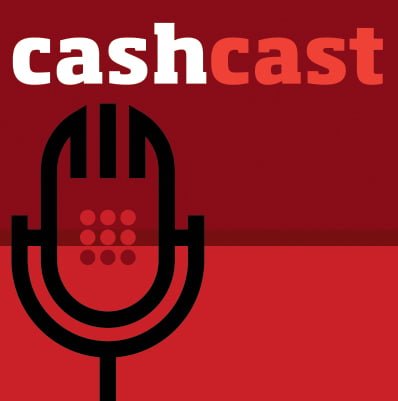
Podcast: Is informed consent possible in humanitarian CVA?
Podcast
Episode 2 of the CashCast tackles data responsibility with Amos Doornbos, Linda Raftree, James Eaton Lee and Ric Tighe

Consent and Ownership in the Shift to Digital Cash and Voucher Assistance
Blog Post
Part of committing to cash and voucher assistance (CVA) is committing to going digital and collecting data. While they are two different things, they are deeply intertwined. And while an organisation can ‘go digital’ without cash programmes, it’s nearly impossible to commit to cash programmes in the long term without going digital. Yes, it is true we’ve done cash and voucher programmes...
Latest
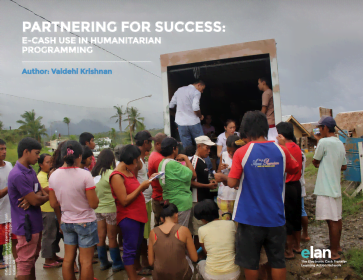
Partnering for Success: E-cash use in humanitarian programming
Policy paper
In recent years, new technologies have facilitated electronic cash transfers (e-transfers) to disaster- and conflict-affected populations. Utilizing e-cash in emergency response requires close partnerships with Financial Service Providers (FSPs), often in places where electronic payments are still...

Cash Transfers: Progress made but challenges remain
Blog Post
In five years cash programming has come from almost nowhere to being – for some donors at least – the preferred option, especially in the field of food and nutrition. “We no long measure food aid contributions in wheat/tons equivalent,” says Julia Stewart-David of the EU aid body, ECHO. “That...

USAID Procurement Executive’s Bulletin 2014-06
Policy paper
This Bulletin applies to USAID’s Acquisition Workforce consisting of Contracting Officers (COs), Agreement Officers (AOs), Negotiators, CO/AO Representatives (CORs/AORs), and Activity Managers worldwide. The purpose of this bulletin is to provide guidance to the Acquisition Workforce on promoting...
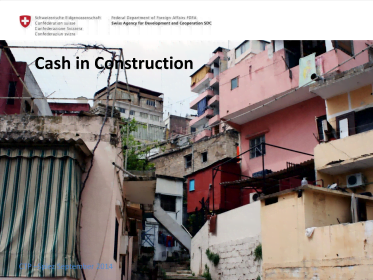
Cash in Construction
Presentation
This Powerpoint was used by SDC during a workshop on CTP and shelter/construction that took place in mid 2014. Click here to download a short introduction Powerpoint on Cash and Shelter from the same event.

Understanding the Demand for Financial Services in Nepal
Report
Nepal has a unique geography consisting of mountains, hills and Terai, which makes it difficult for any financial institution to provide financial services to every part of the country. Formal and informal financial service providers have been attempting to reach more customers at various levels and...
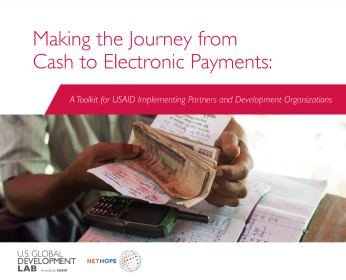
Making the Journey from Cash to Electronic Payments: A toolkit for USAID implementing partners and development organizations
Guidelines and Tools
This Toolkit was created for non-governmental relief and development organizations to guide them in their journey of transitioning from using cash payments to electronic payments in all operational and program payment streams. It is intended to be practical, easy to follow, bite-size, sectional, with...
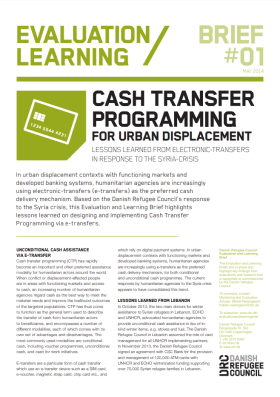
Cash Transfer Programming for Urban Displacement
Policy paper
In urban displacement contexts with functioning markets and developed banking systems, humanitarian agencies are increasingly using electronic-transfers (e-transfers) as the preferred cash delivery mechanism. Based on the Danish Refugee Council’s response to the Syria crisis, this Evaluation and...

Information and communications technology response to the Liberia ebola crisis
Report
An information and communication technology assessment recently conducted in Liberia by NetHope and USAID addresses the potential for digital payments in the response to Ebola. The documents looks into the digital payments landscape, describing the banking sector, use of mobile money and remittance firms....

Testing Branchless Banking to Deliver Cash Transfers in Nepal
Policy paper
The Human Development Social Protection Pilot (HDSPP) is a sub-project of the joint UNDP-UNCDF Local Governance and Community Development Program (LGCDP). It has been initiated in two far-western districts in Nepal, Kanchanpur and Dhadheldura and it is being implemented by the Ministry of Federal Affairs...
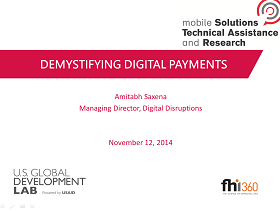
Demystifying Payments – mStar
Report
In its simplest form, a payment is any exchange of value between two parties, where usually Party A offers a form of currency in exchange for a good or service provided by Party B. The advent of nation-states issuing fiat currency, such as paper bills and bronze coins, which unlike gold or silver...
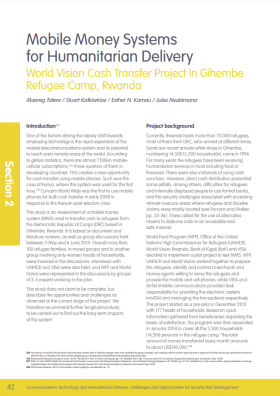
Mobile Money Systems for Humanitarian Delivery: World Vision cash transfer project in Gihembe refugee camp, Rwanda
Report
One of the factors driving the steady shift towards employing technology is the rapid expansion of the mobile telecommunications system and its potential to reach even remote areas of the world. According to global statistics, there are almost 7 billion mobilecellular subscriptions, three-quarters of them...
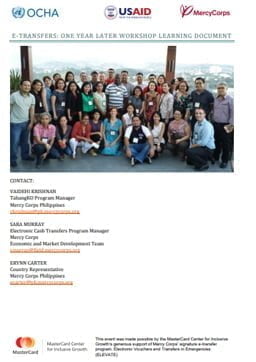
E-Transfers: One Year Later Workshop Learning Document
Report
In the aftermath of Typhoon Haiyan (known locally as Typhoon Yolanda), an estimated half million storm-affected Filipinos received an electronic cash transfer (e-transfer) to help them rebuild and recover from the storm’s devastation. The presence of a large number of Financial Service Providers...
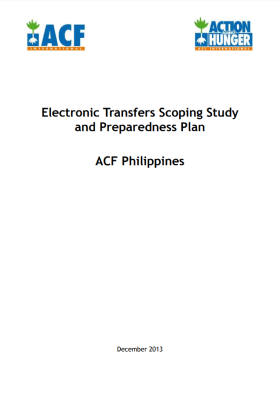
Electronic Transfers Scoping Study and Preparedness Plan
Policy paper
This piece of work was arranged by Action Against Hunger (ACF), with the intention of understanding the electronic payment services available in a minimum of two country missions and to support ACF in preparing for future humanitarian response in country and globally, with a specific focus on...

Disaster Response: Mobile Money for the Displaced
Report
Advances in mobile technology have opened up new opportunities, not only for communication, but also for using the mobile handset as a platform for a range of applications. The introduction of data transfer facilities and the rise of mobile financial services around the world have allowed mobile money...

Factors Affecting the Cost-efficiency of Electronic Transfers in Humanitarian Programmes
Report
Led by Oxford Policy Management (OPM) with support from Concern Worldwide, this research aims to answer the key question: Are electronic transfers more cost-efficient than traditional manual based cash delivery methods, and under what conditions? Cash is increasingly offered to households in...

Unconditional Cash Assistance via E-Transfer: Implementation lessons learned – Winterization support via CSC bank ATM card
Report
This document looks at the lessons learned from the Danish Refugee Council’s e-transfer programme designed to provide cash assistance to Syrian refugees in Lebanon using the CALP Network’s guidelines on e-transfers in emergencies as a point of reference for assessing adherence to best practices.

Payment Mechanisms and Anti-Poverty Programs: Evidence from a Mobile Money Cash Transfer Experiment in Niger
Report
Cash transfers have become an increasingly important component of social protection policies in both developed and developing countries. While such programs are often implemented electronically in developed countries, in many developing countries with weak financial infrastructure, such transfers are...
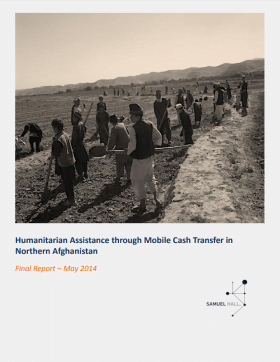
Humanitarian Assistance through Mobile Cash Transfer in Northern Afghanistan: An evaluation of a DFID pilot project in Faryab, Jawzjan, and Samangan
Report
In response to the 2011 severe drought that pushed vulnerable rural households into food insecurity in 14 provinces of Northern Afghanistan, DFID has committed to address emergency needs in northern Afghanistan with nutrition, food security and farming inputs. Samuel Hall Consulting, a Kabul-based...
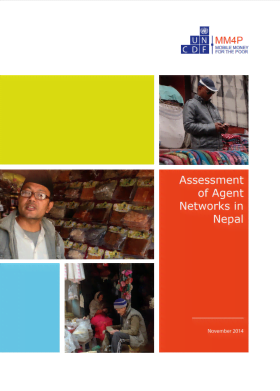
Assessment of Agent Networks in Nepal
Report
This report focuses on assessing the existing agent networks in Nepal, so that the correct steps can be taken to popularise both access to and use of financial services through bank-led agent banking. After the release of electronic banking regulations in 2012, many financial institutions began...
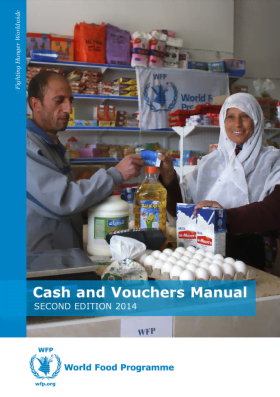
Cash and Vouchers Manual – Second edition
Guidelines and Tools
This second edition of the Cash and Vouchers Manual captures the latest corporately endorsed business processes and procedures, providing the most up-to-date tools (i.e. analytical, assessment, monitoring) that have been developed through close intra-departmental collaboration between Headquarters...


